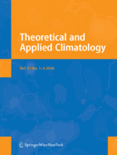
THEORETICAL AND APPLIED CLIMATOLOGY
Scope & Guideline
Fostering Excellence in Climatological Research
Introduction
Aims and Scopes
- Climate Variability and Change:
Research on the effects of climate variability and change, including studies on extreme weather events, seasonal changes, and long-term climate trends. - Hydrological Processes:
Investigations into hydrological cycles, water resource management, and the impact of climate on hydrological extremes such as floods and droughts. - Climate Modeling and Projections:
Utilization of climate models, including CMIP6 and other regional climate models, to project future climate scenarios and assess model performance. - Impact of Climate on Agriculture and Ecosystems:
Studies focusing on the implications of climate change for agriculture, including crop yield predictions and the resilience of ecosystems to changing climatic conditions. - Urban Climate Studies:
Research examining the effects of urbanization on local climates, including urban heat islands and the influence of land use on climate variables. - Climate-Induced Risks and Adaptation Strategies:
Analysis of climate-induced risks, vulnerability assessments, and the development of adaptation strategies for communities and ecosystems. - Remote Sensing and Climate Data Analysis:
Application of remote sensing technologies and innovative statistical methods for analyzing climate data, including precipitation and temperature trends.
Trending and Emerging
- Machine Learning and AI Applications:
There is a rapid increase in the use of machine learning and artificial intelligence techniques for climate modeling, prediction, and data analysis, reflecting a trend towards more sophisticated analytical methods. - Climate Change Adaptation Strategies:
Research focusing on adaptive measures to mitigate the impacts of climate change on agriculture, urban planning, and natural ecosystems is gaining traction, highlighting the need for practical solutions to climate-related challenges. - Integrated Climate-Hydrology Models:
An emerging emphasis on integrated models that combine hydrological and climatic factors to better predict and manage water resources under changing climate conditions. - Climate-Induced Extreme Events:
A growing body of work is dedicated to understanding the occurrence and impacts of extreme weather events, such as floods, droughts, and heatwaves, in the context of climate change. - Remote Sensing Innovations:
Advancements in remote sensing technologies and methodologies are increasingly being applied to monitor climate variables, providing new insights into climate dynamics and environmental changes. - Teleconnections and Climate Patterns:
Research on teleconnection patterns and their influence on regional climates is expanding, providing deeper insights into the interconnectedness of global climate systems.
Declining or Waning
- Historical Climatology:
Research centered on historical climatology and long-term climate reconstructions has seen a decline, as more emphasis is placed on predictive modeling and contemporary climate impacts. - Static Climate Classification Studies:
Traditional approaches to climate classification, such as the Köppen classification system, are becoming less prominent compared to dynamic models that incorporate climate change impacts. - Local Case Studies:
While localized studies remain important, there is a noticeable shift towards broader, comparative analyses across regions, potentially leading to a decline in the number of case studies focusing solely on specific locales. - Traditional Statistical Methods:
Standard statistical methods for trend analysis are being overshadowed by more innovative and complex methodologies, including machine learning and hybrid approaches. - Anthropogenic Climate Impact Assessments:
Direct assessments of anthropogenic impacts on climate systems are becoming less frequent as the focus shifts towards broader climate interactions and feedback mechanisms.
Similar Journals

Atmosphere is a premier open-access journal dedicated to the field of atmospheric sciences, published by MDPI since 2010. With an E-ISSN of 2073-4433, the journal has established itself as a significant platform for the dissemination of research on atmospheric processes, climate change, and environmental dynamics. Based in Switzerland, the journal has garnered impressive recognition within the academic community, currently ranked in the 3rd quartile for Atmospheric Science and the 2nd quartile for Environmental Science (miscellaneous) as of 2023. Notably, it holds a commendable Scopus rank, emphasizing its impact with a 69th percentile standing in its category. Atmosphere aims to foster innovative research and comprehensive reviews that contribute to the understanding of air quality, climate policy, and environmental sustainability. Its open-access model not only supports the global sharing of knowledge but also enhances visibility and engagement among researchers, professionals, and students alike, making it an essential resource for anyone invested in the study of our planet's atmosphere.
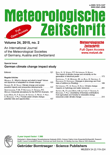
METEOROLOGISCHE ZEITSCHRIFT
Charting New Territories in Meteorological StudiesMETEOROLOGISCHE ZEITSCHRIFT is a distinguished academic journal dedicated to the field of meteorology and atmospheric sciences, published by E SCHWEIZERBARTSCHE VERLAGSBUCHHANDLUNG. With an ISSN of 0941-2948 and an E-ISSN of 1610-1227, this journal has been an invaluable resource for researchers, professionals, and students since its inception. It has embraced an Open Access model since 2014, promoting wider dissemination of research findings. Based in Stuttgart, Germany, the journal is recognized for its rigorous peer-review process and is currently positioned in the Q3 quartile for Atmospheric Science as per the 2023 category rankings. Additionally, it ranks #97 out of 148 in the Scopus database, placing it in the 34th percentile among Earth and Planetary Sciences. Covering a broad spectrum of topics relevant to meteorology, METEOROLOGISCHE ZEITSCHRIFT serves as a platform for innovative research and theoretical contributions, aiming to advance understanding of atmospheric phenomena and their implications for climate and weather. Researchers and practitioners alike will find valuable insights within its pages, making it a significant asset in the landscape of meteorological scholarship.
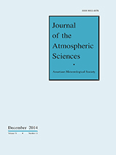
JOURNAL OF THE ATMOSPHERIC SCIENCES
Transforming Knowledge into Atmospheric UnderstandingJOURNAL OF THE ATMOSPHERIC SCIENCES, published by the American Meteorological Society, stands as a premier resource for the latest research in atmospheric sciences. With an impressive impact factor and a Q1 ranking in the Atmospheric Science category for 2023, this journal is recognized for its rigorous peer-reviewed articles that contribute to the understanding and advancement of weather, climate, and dynamics of the atmosphere. Established in 1969, the journal has maintained high academic standards and delivers valuable insights spanning over five decades, thus catering to an audience of researchers, professionals, and students alike. Although it does not offer open-access options, it provides critical access through various institutional subscriptions, ensuring that significant research findings are disseminated widely within the scientific community. The journal's address is located at 45 Beacon St, Boston, MA 02108-3693, United States, and it accepts submissions and articles until 2024, continuing its legacy of excellence in atmospheric research.

Journal of Tropical Meteorology
Empowering Meteorological Insights for a Changing ClimateJournal of Tropical Meteorology, published by JOURNAL OF TROPICAL METEOROLOGICAL PRESS, is a leading scholarly journal dedicated to advancing the understanding of atmospheric phenomena and meteorological patterns in tropical regions. With an ISSN of 1006-8775, this journal plays a vital role in disseminating high-quality research, focusing on critical issues such as climate variability, weather forecasting, and tropical cyclone dynamics. The journal, which is indexed in Scopus with a respectable rank in the low quartile of Q3 in Atmospheric Science, aims to provide a platform for researchers and professionals to share groundbreaking insights and foster collaboration within the scientific community. Although it follows a traditional access model, the Journal of Tropical Meteorology encourages submissions from a diverse range of disciplines, thus enriching the field with a variety of perspectives. By bridging theory and practical applications, this journal serves as an essential resource for students, researchers, and practitioners striving to expand their knowledge and contribute to the global conversation on meteorology.
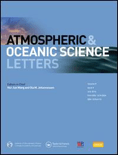
Atmospheric and Oceanic Science Letters
Unlocking the Secrets of Our Planet's SystemsAtmospheric and Oceanic Science Letters is a premier open-access journal dedicated to the rapidly evolving fields of atmospheric science and oceanography. Published by KEAI PUBLISHING LTD, this journal aims to foster research dissemination and collaboration by providing a platform for high-quality research articles, reviews, and case studies that address critical issues impacting atmospheric and oceanic systems. With an impressive impact factor reflecting its esteemed position—including being ranked Q2 in Atmospheric Science and Q1 in Oceanography in 2023—this journal is an essential resource for researchers, professionals, and students alike. The journal's Open Access model, adopted since 2016, ensures that groundbreaking research is readily available to a global audience, enhancing knowledge transfer and facilitating innovative solutions to environmental challenges. Operating out of the United Kingdom and reaching an international readership, Atmospheric and Oceanic Science Letters plays a pivotal role in shaping our understanding of the interactions between the atmosphere and oceans, making it a vital publication for anyone aiming to stay at the forefront of these dynamic scientific fields.

Weather and Climate
Illuminating Insights on Meteorological TrendsWeather and Climate is a prestigious, peer-reviewed journal published by the Meteorological Society of New Zealand, dedicated to advancing knowledge in the domains of meteorology and climatology. With the ISSN 0111-5499, the journal serves as a vital platform for researchers and professionals to disseminate impactful findings that address pressing issues related to weather patterns and climate change. Although it does not operate on an open-access model, it provides a wealth of valuable insights drawn from a diverse range of studies. The significance of this journal in the scientific community is underscored by its commitment to fostering interdisciplinary collaboration and sharing innovative research that can inform policy-making and environmental management strategies. Located in Wellington, New Zealand, Weather and Climate not only contributes to regional meteorological discourse but also holds relevance for the global scientific landscape, making it essential reading for anyone invested in the future of our changing climate.
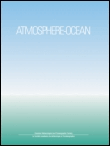
ATMOSPHERE-OCEAN
Charting New Waters in Environmental ResearchATMOSPHERE-OCEAN is a premier peer-reviewed journal published by Taylor & Francis Ltd, dedicated to advancing the fields of atmospheric science and oceanography. Since its inception in 1963, this journal has served as a crucial platform for researchers, professionals, and students, facilitating the dissemination of significant findings and innovative methodologies in understanding the complex interactions between the atmosphere and the ocean. With its journal ranking in the Q3 category for Atmospheric Science and Q2 for Oceanography as of 2023, along with its Scopus rankings, ATMOSPHERE-OCEAN maintains its relevance by addressing current topics such as climate change, hydrology, and ocean circulation patterns. For those seeking to contribute to or stay informed about the latest research in these critical fields, ATMOSPHERE-OCEAN is an invaluable resource that combines rigorous scholarship with practical implications for environmental management and policy.
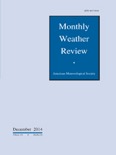
MONTHLY WEATHER REVIEW
Unveiling Insights into Meteorological PatternsMONTHLY WEATHER REVIEW, published by the American Meteorological Society, is a leading journal in the field of atmospheric science, recognized for its rigorous peer-reviewed articles that contribute significantly to the understanding of weather patterns and climate systems. With an impressive Q1 ranking in the 2023 category quartiles and a strong standing (#41 out of 148) in the Earth and Planetary Sciences Scopus rankings, the journal serves as an essential resource for researchers, professionals, and students alike. Although it does not currently offer open access, its comprehensive coverage of meteorological research spanning from 1960 to 2024 makes it invaluable for those seeking to stay at the forefront of developments in weather analysis and prediction. Situated in Boston, Massachusetts, this journal not only showcases pioneering research but also emphasizes the importance of collaborative efforts in the meteorological community, ultimately contributing to advancements in our understanding of atmospheric phenomena.
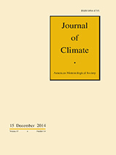
JOURNAL OF CLIMATE
Illuminating the Path to Climate UnderstandingThe JOURNAL OF CLIMATE, published by the American Meteorological Society, stands as a premier source of cutting-edge research in the field of atmospheric science. With an impressive impact factor reflecting its rigorous peer-review process, this journal ranks in the top 20 of its category according to Scopus, with a remarkable percentile of 88th. Since its inception in 1988, the JOURNAL OF CLIMATE has been a vital platform for disseminating high-quality studies that deepen our understanding of climate systems and their global implications. It serves a diverse audience of researchers, professionals, and students interested in climate variability, climate change, and the dynamics of atmospheric processes. Though not an open-access journal, it offers wide accessibility through numerous academic repositories. As it continues to publish essential findings up to 2024, this journal plays a crucial role in advancing knowledge and fostering dialogue within the atmospheric science community.

Weather and Climate Dynamics
Transforming Research into Climate SolutionsWeather and Climate Dynamics, an esteemed journal published by COPERNICUS GESELLSCHAFT MBH, focuses on the intricate relationships and processes governing climate and weather patterns, advancing our understanding of atmospheric sciences. Since its launch in 2020, this Open Access journal has rapidly gained recognition, achieving a commendable Q1 status in Atmospheric Science and ranking 39th out of 148 journals in the Earth and Planetary Sciences category, placing it in the 73rd percentile. Based in Germany, the journal aims to provide a platform for innovative research, sharing crucial findings that contribute to tackling global climate challenges. Researchers, professionals, and students alike are encouraged to explore the wealth of knowledge contained within its pages, as it continues to shape the discourse on weather and climate dynamics through rigorous and impactful scholarship.